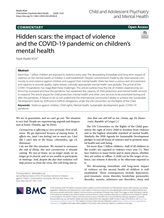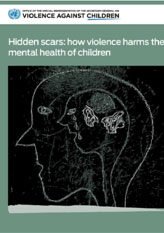Mental Health
According to a report by the Office of the Special Representative of the Secretary-General on Violence against Children, “more than 1 billion children – half of all children in the world – are exposed to violence every year”. In Pakistan, Sahil, a local child rights organization states that at least 8 children faced abuse each day in 2020. We know that those statistics only stand for the tip of the iceberg.
To break the intergenerational cycle of violence, and eventually create a safe and conducive society for our children, it is critical to focus on adequately preventing and responding to Violence Against children (VAC), Violence against Women (VAW) and GBV in general. To this end, ensuring that mental health is taken into consideration and integrated into a systemic child protection and child justice mechanism is critical.
Check below to learn more about GDP’s work related to clinical and non-clinical mental health.
1. Children’s Participation in High-Level Political Forum 2021
Children from around the world including Pakistani children participated in the High Level Political Forum 2021 to emphasize on the need to improve mental health which is the finding of the CovidUnder19 global survey in which 26,000 children participated.
- Click on the link below to read the joint statement and call to action:
- Please click on the link below to read the report Hidden Scars: the impact of violence and the COVID-19 pandemic on children’s mental health.
2. GDP Collaborates with MHPSS to extend Psycho-social Support at Community Level
Mental Health and Psychosocial Support (MHPSS) is an initiative launched by the Pakistani Ministry of Planning, Development, and Special Initiatives as part of its emergency response to the COVID-19; it is funded by UNICEF Pakistan. The aim of this initiative is to develop an evidence-driven MHPSS model which is right-based, scalable, and sustainable.
The initiatives aim at raising public awareness for both the psychosocial well-being of at-risk populations and address the stigma and discrimination of infected populations. Group Development Pakistan (GDP) has partnered with MHPSS to reach out to vulnerable children, adolescents, and their families in ICT for extending mental health support.
To date, 13 GDP staff have been trained via the MHPSS program.
3. International Journal of Risk and Recovery; “Forensic Psychiatry in Pakistan: An Update.
This article was written by Dr. Tariq Hassan (Forensic Psychiatrist), advocate Wajahat Ali Malik, Cameron Arnold, and Ahila Vithiananthan (Department of Psychiatry, Queen’s University). It acknowledges GDP’s contribution to those historic efforts to promote a mental health perspective while addressing crimes impacting children (as accused, witnesses, or victims).
Please click on the link to read the article: https://tinyurl.com/yat4vpa4






